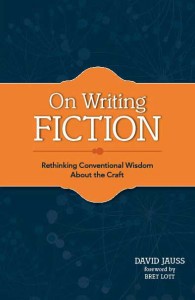Jauss, David (2011). On Writing Fiction: Rethinking Conventional Wisdom About the Craft. Cincinatti, OH: Writers Digest Books.
This is a most engaging and helpful “How-to-do-it” book for experienced writers. Its seven essays are thought-provoking and clarifying, well-written and insightful, by a long-time teacher of creative writing. It is perhaps the best craft book I’ve read in a year. It’s not about fundamentals however, so if you’re looking for tips on how to develop a character or plot a plot, you won’t find them here. This book concerns the deeper intricacies of the craft for someone who has already learned the basics.
The second essay is one of the best, about narrative distance. Jauss reviews various narrative strategies, and focuses on the third person narrator, which can be objective, outside a character, reporting only observable behavior and speech (as a playwright must do); or the narrator can be “close,” inside the head of the character; an observer and reporter of the character’s innermost thoughts and feelings. A third-person narrator, in skilled hands, can cover both those poles and all the distance in between. The most interesting part of the essay is a discussion of “indirect interior monolog,” in which the narrator’s voice virtually merges with the character’s, a technique more commonly called free indirect discourse, or free indirect speech. Jauss’ name for it is unique, but more descriptive than the standard terms.
There are equally insightful articles on managing time in fiction, from present tense descriptions to reminiscences and flashbacks, to proleptic commentary, to full projection into the future. Compression and dilation of time are special artistic tools only fiction writers have at their disposal.
A strong essay criticizes the current fad of using the present tense. Jauss lists and explains a dozen shortcomings inherent to the present tense, along with a couple of advantages it offers to authors. He also has apparently had it with epiphanies, which are de rigeur in modern fiction. They’re usually obvious, unearned, and unnecessary, he says, and unrealistic besides. Epiphanies are rare in real life, and when they do occur, they often fade quickly or turn out to be wrong. Epiphanies are overdone in fiction, he suggests.
The essays cite a cornucopia of well-known works of fiction as examples, but you would have to be very well-read to benefit from them, especially references to individual short stories. How many published stories are out there? Tens of millions? Jauss’ citation of such examples gives the impression that the book is addressed to MFA students who would be aware of some implicit canon. Academic insider-speak aside, the essays in this book are consistently informative and often revelatory.

